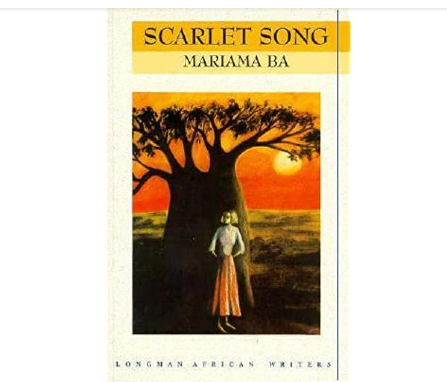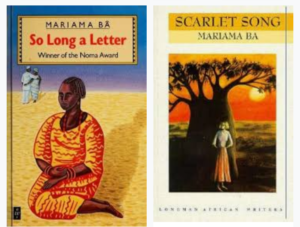
Book Review: Scarlet Song by Mariama Ba
TITLE: Scarlet Song
AUTHOR: Mariama Ba
FIRST PUBLISHED: 1981
PUBLISHER: Longman in Harlow
LENGTH: 171 Pages
GENRE: Novel.
REVIEWERS: Cynthia Rioki & Onana Victor
REVIEW
Scarlet Song is a story curved around a mixed-race marriage involving a Senegalese young man, Ousmane Gueye and a French lady, Mireille.
The duo’s marriage revolves around a myriad of major issues such as race, cultural disparity, post colonialism, gender inequality in marriage and society amongst many others.
It’s worth noting that the original version of Scarlet Song was written in French, a colony of West Africa and later translated to English. Ba, a Senegalese woman seem to artistically pause a critique on gender inequality and struggles of womanhood towards self realization as she herself did suffer a similar fete.
The novel start by introduction of Ousmane Gueye, a Senegalese student in 1960s. He is born to a poor muslim father and we also see his closeness to Yaye, his mother, whom he values above all, including religion.
In Ousmane’s earlier days he had a budding romance with a childhood friend from his village, Ouleymatou who rejected him for being “mama’s boy.” He then throws himself to his and forgets dating. He hopes to challenge his humble beginning to live better life. To him, education is the starter. He then makes it to university in Dakar.
He runs into Mireille, a French diplomat’s daughter. The girl is way better off as she drives a limousine to and from school. They fall in love despite the wide economic gap between them. Mireille’s father is later agitated upon learning of his daughter is dating a black man he sends Mireille back to France.
Mireille engages in student protests of 1968 back in France, Ousmane too takes to a sit-in back in Dakar. Both are politically conscious and make efforts to change. Their romance remain despite the distance. They secretly share communication as they continue to get of age. This will help them evade their father’s consent.
Finally, they both graduate and begin to teach. Ousmane makes it to France to marry her but keeps it away from his parents. Later his father accepts the match but the mother doesn’t like Mireille at all. Yaye thinks she has somehow inganged her son.
Ousman begins to change as things unfold. He struggles to balance his academic life and marriage whereas Mireille equally suffers putting up with African and Muslim traditions. She sacrifices her family and friends to accommodate. Ousman is fast losing his roots too. Yaye becomes a terrible mother-in-law. Mireille is traditionally to be totally submissive to her mother-in-law’s but she’s defeated. Yaye complains a lot about it.
Ousmane seems won over by his mother and he starts to ignore his wife. The marriage gets strained as she gets pushed away.
Ouleymaton, Ousmane’s childhood lover wins him over back. She’s so traditional just as Yaye had wanted of Mireille. Ouleymaton drags Ousmane into herself. She craves Ousmane’s academic success and views his as prosperous. Ouleymaton lust for him and his wealth. Open seduce follows. In his fashioned confusion, he gives in to her raw lustful desires.
Muslim permits polygamous Ouleymaton is focused at second position wife. Bâ reveals the threats in polygamous arrangements as affectionless. Wives have no way to quit or find fulfilment for themselves.
Ousmane hides the secret from Mireille who has become increasingly lonely, at about same time, Mireille conceives. Mireille observes that Ousmane spends minimal time with her and begins to suspects him of an affair. Eventually, the truth is out. Mireille goes insane, frenzied rage. She kills their own son with sleeping pills and tries to kill Ousmane by stabbing. Ousmane survives the attack, however Mireille doesn’t survive the mental state. She is deported.
Scarlet Song is a cocktail of gender roles, culture, marital tolerance, education, racism, love, and betrayal. Rest in peace, Ba.

